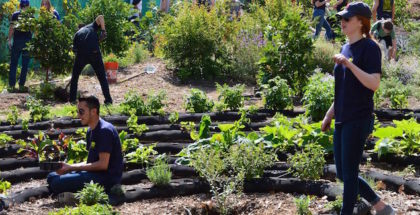Urban Farming Program at Indiana High School Teaches Students to Farm and Embrace Entrepreneurship
January 20, 2016 | AJ Hughes

A student at Thea Bowman Leadership Academy handles chickens inside their coop at the school’s farm. (Photo courtesy Lynda Bodie/Thea Bowman Leadership Academy)
Gary, Indiana, known for being the birthplace of Michael Jackson and home to massive steel plants, now has a high school with an urban farm program.
Last year, students at Thea Bowman Leadership Academy in Gary started the urban farm. It’s founded and operated under the principles of a business plan written as part of an entrepreneurship and personal finance class curriculum.
The seed for this farm was planted when school instructor Lynda Bodie began a 4-H club at the academy. Several nearby farmers gave chickens to the new 4-H’ers, who in turn showed them at the county fair. But it didn’t stop there—the Bowman Academy 4-H’ers, under the guidance of Bodie, used their chickens to start a burgeoning business.
“It evolved, starting about six years ago,” says Bodie. “Parents, coworkers and others were tired of looking at unhealthy teenage kids with unhealthy diets.”
So Bodie and the school’s Parent Teacher Association president decided to start a garden. They bought wood and built a raised bed. County Line Orchard in Hobart later gave the school plants and more raised beds.
But there was a problem. Bodie was the de facto leader of this new school garden, but she admits that at the time, she knew nothing about gardening. So she sought advice from the Lake County office of Purdue University Extension and was given a book that came out of the Junior Master Gardener program. Bodie saw that the book was influenced by the 4-H program, which she had heard of, but did not know much about.
By this point, Bowman students involved with the garden grew salad fixings, but were not involved in the broader realm of agriculture. After learning more about 4-H, Bodie thought some of the students could start showing animals through 4-H.
As a result, they began with a goat and chickens from local families. However, the students were not content with merely showing—they wanted to take it a step further.
“We showed chickens at the fair and decided to keep them, and then built a coop,” Bodie says. “When the hens started laying, another 4-H’er gave more hens to the school. We had at least a dozen eggs daily, and the students started a business.”
Again, students weren’t content with the status quo. They not only wanted to produce eggs, but sell them as well. Hence, they procured an egg-selling license from the state of Indiana. In addition to selling eggs, greens and produce to friends and parents, they also sell to LOAF, a specialty grocery store in nearby Chesterton that procures its food from local farms.
Bodie and her students want the school’s urban farm to continue expanding. There’s a vacant lot next to the school she hopes can be used for the school’s farming endeavor.
“We want a functional and larger sustainable farm, both for education and employment,” she says.
Ultimately, Bodie feels what students learn from working at the school’s farm extend well beyond agricultural knowledge. Bodie, who was born in Gary and raised in Chicago, and until this journey knew zilch about agriculture, is learning alongside her students.
“We’re working to bring farming back to Gary and revitalize the community,” she says. “Kids learn life skills, as well as animal care and knowing where food comes from.”
Students are also learning business and life skills through hands-on experience. Recently they had to call people from the City of Gary to find about city ordinances.
“Our kids see opportunities in things they never considered and did not even know existed,” Bodie says. “One kid heard about food science for the first time, and now has been accepted into Purdue’s food science program. There are lots of benefits, some we cannot even measure.”
The class running the garden has its business bank account to manage, and fundraising for the project took place at the beginning of the school year. They are actively looking for grant opportunities.
Consistent with the theme of students becoming ambitious and enterprising sustainable farmers, Bowman Academy’s urban farm now has its own goat, which will live on campus. Students are also looking to power the farm with solar and wind energy.
“Hopefully, we’ll stay on the cutting edge,” Bodie says.
This article was originally published on Seedstock.com: http://seedstock.com/2015/12/15/indiana-school-farm-teached-urban-farming-entrepreneurship/













Submit a Comment